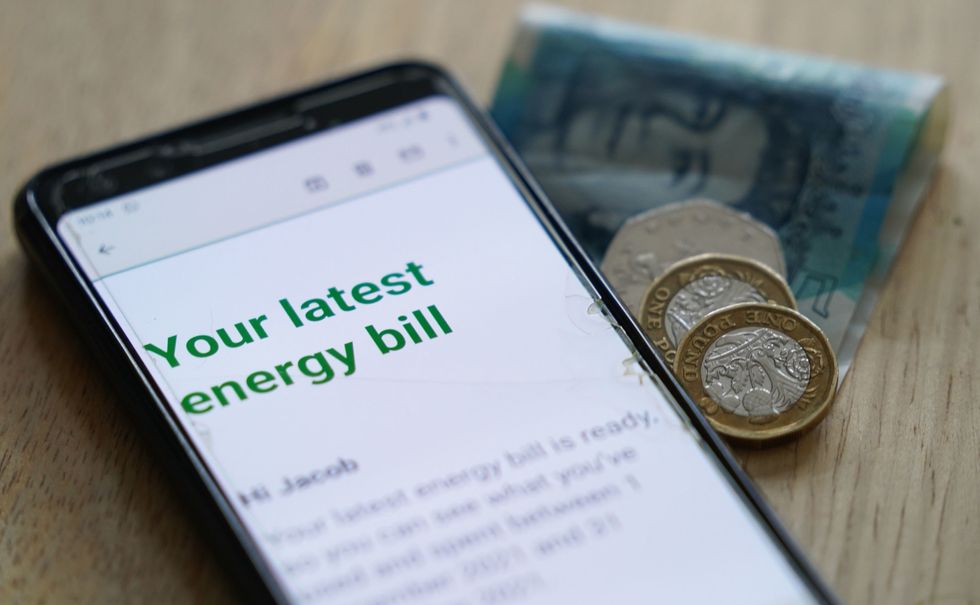Energy bills to FALL by £129 in July - Ofgem confirms price cap drop

Energy bills to fall in July as Ofgem confirms price cap drop |
GBNEWS

This marks the first decline in bills after three consecutive increases
Don't Miss
Most Read
Household energy bills will fall by around seven per cent this summer after Ofgem confirmed its latest price cap update.
From July, the average annual bill for a typical household will drop by £129 to £1,720, down from the current level of £1,849.
The energy price cap will fall by seven per cent from July 1 for a typical household in England, Scotland and Wales, Ofgem has said. The average annual bill for a typical household will drop around £11 a month, bringing the total to £1,720.
The price cap limits how much suppliers can charge per unit of electricity and gas, and is reviewed quarterly.
The latest cut follows a sharp decline in global gas and oil prices, triggered by tariff threats from US President Donald Trump that disrupted energy markets.
While the drop offers some relief for households, it is slightly smaller than the nine per cent fall that had been forecast earlier in the spring, due to a recent easing in global trade tensions.
The regulator said the main driver of the cut is a fall in international wholesale energy prices, though the typical bill still remains £152 (10 per cent) higher than it was during the same period last year. It is, however, £660 (28 per cent) lower than at the height of the energy crisis in early 2023, when the Government introduced the Energy Price Guarantee.
 Energy bill payers have been forced to pay more in recent years | PA
Energy bill payers have been forced to pay more in recent years | PACornwall Insight said it expects the reduced price cap to be followed by a "modest drop" in October and another similar dip in January next year.
News of a fall in energy costs will come as a relief for households, who suffered through an "awful April" of bill rises, including Ofgem’s last 6.4 per cent price cap increase.
Households already struggling with soaring living costs have been hit by the steepest rise in water bills since records began in February 1988, adding to pressure from higher council tax, road tax, and rising mobile and broadband charges.
The spike in household bills helped push Consumer Prices Index (CPI) inflation up to 3.5 per cent in April, from 2.6 per cent in March - the highest level since January 2024.
LATEST DEVELOPMENTS:
 Britons could save money on energy bills | GETTY
Britons could save money on energy bills | GETTY Craig Lowrey, principal consultant at Cornwall Insight, welcomed the cut in the energy price cap confirmed for July, but warned it won’t be enough to ease the wider financial strain.
He said: "The fall in the price cap is a welcome development and will bring much-needed breathing space for households after a prolonged period of high energy costs.
"But it should be taken in context. Prices are falling, but not by enough for the numerous households struggling under the weight of a cost-of-living crisis, and bills remain well above the levels seen at the start of the decade. There remains a risk that energy will stay unaffordable for many."
Energy Secretary Ed Miliband welcomed the reduction but stressed that the Government’s long-term goal is to move away from fossil fuels.
He said: "This fall in energy bills is welcome news for families across the country and will mean that working people keep more of their money in the coming months. But we know it’s only through clean, homegrown power that we can get off the rollercoaster of fossil fuel markets controlled by dictators and petrostates."
Miliband added that the Government is "doing everything we can" to support households – including consulting on expanding the £150 Warm Home Discount to reach six million households next winter, upgrading thousands of homes to cut heating costs, and reforming the energy market to better protect consumers.

Energy bills to FALL in July
| GETTYTim Jarvis, Ofgem’s director general for markets, said the drop in the price cap is "welcome news" but acknowledged that energy prices remain high for many.
He said: "We’re acutely aware that some people continue to struggle with the cost of energy,” he said. “That’s why we’re urging consumers to shop around – you don’t have to pay the price cap. Changing payment method to direct debit or smart pay-as-you-go could save you up to £136."
Jarvis added that Ofgem is pushing forward with changes to support customers in debt and plans to reform standing charges ahead of this winter.
He continued: "We’re working closely with the Government to bring in the investment needed to hit our clean power and net zero targets, so prices become more stable in the long term."
Ofgem updates the energy price cap every three months, based largely on changes in wholesale energy markets.
The cap, first introduced by the Government in January 2019, sets a maximum price suppliers can charge per unit of energy in England, Scotland and Wales. However, it does not cap total bills, consumers still pay for every unit of energy they use.
More From GB News










